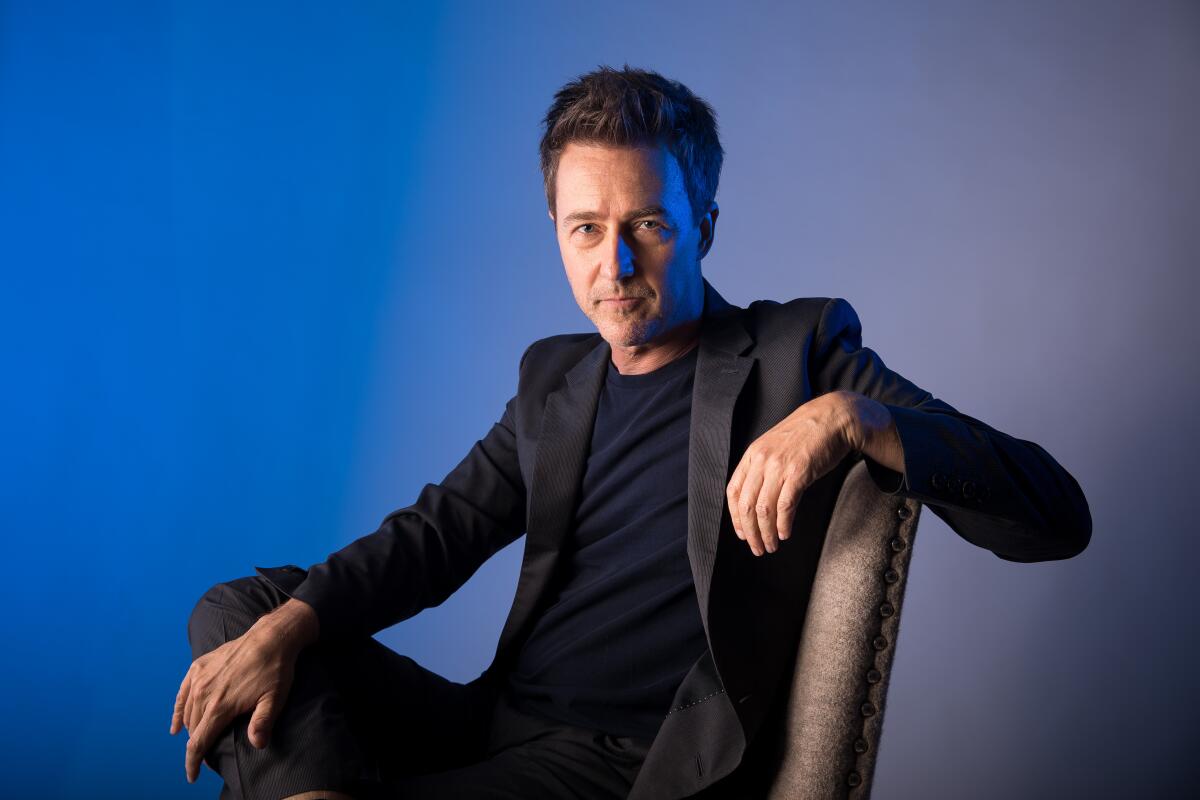‘Greedy actor’ Edward Norton dives into New York history for ‘Motherless Brooklyn’

- Share via
Jonathan Lethem’s offbeat detective novel “Motherless Brooklyn” had barely hit bookshelves in 1999 when actor Edward Norton persuaded New Line Cinema to purchase the movie rights. Twenty years later, Norton’s film adaptation has finally emerged as a finished product — a sweeping, ambitious crime epic that doubles as a secret history of midcentury New York City.
Norton didn’t always know he needed to direct the film. But from the moment he discovered protagonist Lionel Essrog, a sensitive gumshoe with Tourette syndrome and a photographic memory, he knew he had to play him.
“The greedy actor impulse definitely came first,” Norton says. “The character is such a rich mess of paradoxes. He’s afflicted but talented, he’s funny but also poignant and lonely, he’s underestimated but he’s also a hard-boiled, street-hardened orphan.”
While starring in such films as 1999’s “Fight Club” and 2002’s “25th Hour,” which cemented his reputation as Hollywood’s most talented and versatile young actor, Norton kept thinking about what to do with Lethem’s novel, which is set in an ambiguous contemporary moment but whose characters speak in a kind of 1950s slang.
“In 2003, I sort of took a year off,” Norton says. “I started meditating on ‘Motherless Brooklyn,’ and in that period I was also going deep on New York history. I would wake up with these kind of odd ideas, and would call Jonathan [Lethem] and say, ‘I know this would be somewhat bold or radical in the realm of adaptation, but … your characters, they feel like guys out of the ’50s. What do you think about just going fully back?”
Norton expanded his idea of the narrative to include an invented political operative who resembles New York’s midcentury power broker Robert Moses. (He’s played by Alec Baldwin in the film.) What started as a minimalist crime yarn turned into a historical epic, with the novel’s local murder mystery opening up into a chronicle of large-scale racial and economic injustice.
“I started really working on the notion — could we do the story of the hidden crimes of New York the way ‘Chinatown’ tells you the secret story of L.A.? Could we deal with something bigger? And [Lethem] was like: ‘Just run with it.’”
I absolutely anchored the film on the brilliant emotional trick that Jonathan [Lethem] created, which is that you’re inside Lionel’s head but outside his affliction.
— Edward Norton
Norton doesn’t expect the novel’s fans to take any umbrage, because the core of the story’s appeal is left intact. “Nobody’s relationship with that book is a plot-driven relationship,” he says. “It’s completely an emotional relationship with Lionel. I absolutely anchored the film on the brilliant emotional trick that Jonathan created, which is that you’re inside Lionel’s head but outside his affliction.”
Though Norton had only a single film under his belt as a director — the charming but low-key 2000 romantic comedy “Keeping the Faith” — he decided to take the reins on “Motherless Brooklyn.” He says that his friend (and Warner Bros. chairman) Toby Emmerich told him: “‘You should just do it. It’ll be better for you to manage the process. The editing of that role will be part of performing it.’ And he was right about that, because I felt much freer to experiment as an actor knowing that I am giving myself clay to sculpt later.”
To make his job easier, he hired a dream team of theater veterans, including Gugu Mbatha-Raw, Cherry Jones, Willem Dafoe, Bobby Cannavale and Michael K. Williams. Norton says the cast is “close to my equivalent of the Mercury Theatre repertory. I wanted them to have theater chops, so that I knew they would show up and deliver and not have to rely on a lot of trickery around the cut.”
More important, he says, “It’s [mostly] New York actors I’ve worked with since literally I was 24 years old. I didn’t want anybody who wasn’t from here. I think there’s people playing New York dress-up and people who just have the real cellular, adult, mature understanding of it.”
In the end, “Motherless Brooklyn” has helped Norton develop a fluent understanding of the power structures that shaped his home city. “This city is so impossibly rich with hidden stories. But there’s been a lot of damage done in the push to constantly evolve this place.”
Some of it was in his bones — he describes his grandfather, urban developer James Rouse, as “sort of the anti-Robert Moses” — but much of it was the product of his own detective work.
“I think I could’ve acted the part 20 years ago, but I couldn’t have directed it,” Norton says. “I didn’t yet totally understand what I wanted it to be about.”
More to Read
Only good movies
Get the Indie Focus newsletter, Mark Olsen's weekly guide to the world of cinema.
You may occasionally receive promotional content from the Los Angeles Times.










